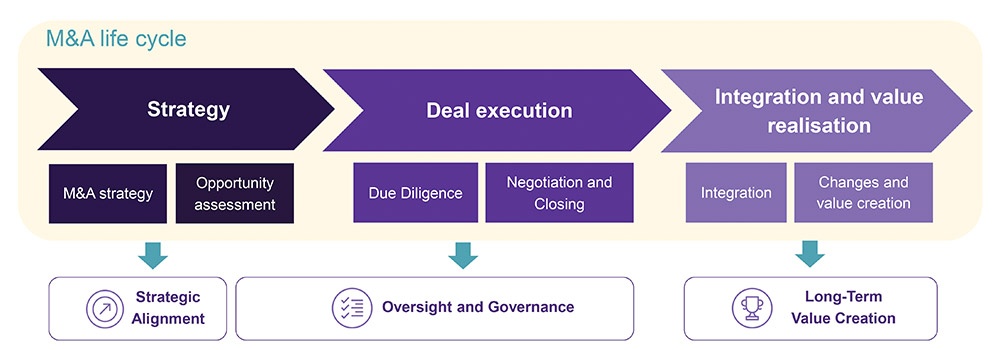The board’s role within merger and acquisition goals
Vietnam’s M&A market recorded a deal value of $3.2 billion in the first nine months of 2024, representing less than 50 per cent of the total for 2023. However, it's too early to conclude a decline for the full year 2024. Compared to the same period in 2023, this figure marks a 45 per cent increase, signaling a potential for dealmakers to drive momentum in the fourth quarter. Domestic dealmakers dominated the scene in the first nine months of 2024, contributing 53 per cent of total deal value. Meanwhile, foreign investors were expected to have limited merger and acquisition (M&A) activity due to broader impacts such as rising inflation and tighter monetary policies in major economies, particularly in the US, Europe, and Japan. These factors have increased capital costs, making cross-border M&A less attractive globally.
 |
| Nguyen Thi Vinh Ha, national head of Advisory Grant Thornton Vietnam |
However, there are early signs of recovery. A significant number of requests for support to evaluate investment opportunities in Vietnam have emerged, particularly from regional investors like Japan, South Korea, Singapore, and China. Additionally, we’ve observed many investment funds are actively seeking opportunities in the market.
Vietnam’s political stability, favourable macroeconomic environment and monetary policy, and the highest-in-the-region projected GDP growth continue to make the country an attractive destination for foreign investors once global macroeconomic challenges are eased out.
The next US administration is also expected to provide a stronger impetus for the ongoing trend of shifting production facilities from China to Vietnam, making M&A an optimal choice for many industries.
M&A transactions have long been recognised as powerful tools for growth strategies and value creation, significantly altering a company’s strategic direction. The board of directors (BoD) plays a crucial role in shaping M&A transactions at every stage, from formulation to integration, ensuring that these deals deliver long-term value.
The success of M&A transactions would not be without the BoD’s oversight and active participation, particularly their role in strategic alignment, oversight, governance, and long-term value creation.
Every transaction originates from a specific strategy, and the role of the BoD begins with ensuring that any potential transaction is grounded in creating long-term value and aligns with the company’s overall development strategy.
The key issues the BoD must address are deal rationale (why is the transaction necessary and does it align with the company’s strategy?), synergy potential (can revenue growth, cost savings, or market expansion be leveraged?), risk assessment (what legal, financial, operational, or reputational risks may arise and how can they be mitigated?), and exit strategy (if the transaction does not meet expectations, what are the contingency plans?).
By carefully considering these factors, the BoD gains a clear understanding so that to give approval for pursuing an M&A, identify measurable and specific expected synergies, ensure effective strategies available to address risks, and to prepare for an exit to minimise potential losses should it require.
 |
Throughout the M&A process, the BoD must maintain oversight to ensure the transaction aligns with strategic priorities. It is responsible for providing strategic guidance that is consistent with the pre-determined strategy. Simultaneously, it needs to enhance oversight across key stages, such as opportunity evaluation, due diligence, negotiation, and transaction completion.
The oversight and governance role of the BoD is a critical link in ensuring the transaction is executed with discipline and accountability, while balancing the interests of shareholders and stakeholders.
One of the most important but often overlooked responsibilities of the BoD is overseeing the post-merger integration (PMI) process. Many transactions fail to deliver their intended value due to poor PMI planning and execution.
The BoD is suggested to exercise the oversight role in several areas. Firstly, it should scrutinise the PMI plan as thoroughly as they would do for strategic alignment. This includes ensuring the plan is designed to capture maximum value and is flexible enough to adapt to new opportunities and risks during the course of the PMI.
The BoD must also ensure that the executive team responsible for the PMI is equipped with the necessary resources and support to execute it effectively. Furthermore, it should adopt appropriate tools to monitor progress, including approval procedures and mechanisms to track the success of the transaction.
An effective oversight mechanism allows the BoD to balance granting autonomy to the executive team in transaction execution while safeguarding shareholder interests.
By actively engaging at every stage, the BoD can help businesses navigate the complexities, achieve growth, and strengthen its position in an increasingly competitive market.
 | Dynamic M&A landscape felt in food and beverages Vietnam’s food and beverage market remains a fertile land for investors to step up merger and acquisition activities, with a focus on expanding product portfolios and developing markets. |
 | Wide M&A prospects for ASEAN players Supported by an influx of capital from developed economies, Southeast Asia now stands as a strategic hub for international investors exploring growth opportunities. Despite this appeal, the market presents specific challenges that necessitate careful navigation. Nonetheless, the momentum in the Southeast Asian merger and acquisition (M&A) sector reflects a resilient and optimistic outlook, signalling strong potential for sustained investment returns. |
 | More vigorous 2025 in sight for M&A deals Although the total value of deals in Asia is the lowest in a decade, the first nine months of 2024 recorded improvement in merger and acquisition (M&A) transaction value in Vietnam – a situation which will be built upon next year. |
What the stars mean:
★ Poor ★ ★ Promising ★★★ Good ★★★★ Very good ★★★★★ Exceptional
Related Contents
Latest News
More News
- Kurz Vietnam expands Gia Lai factory (February 27, 2026 | 16:37)
- SK Innovation-led consortium wins $2.3 billion LNG project in Nghe An (February 25, 2026 | 07:56)
- THACO opens $70 million manufacturing complex in Danang (February 25, 2026 | 07:54)
- Phu Quoc International Airport expansion approved to meet rising demand (February 24, 2026 | 10:00)
- Bac Giang International Logistics Centre faces land clearance barrier (February 24, 2026 | 08:00)
- Bright prospects abound in European investment (February 19, 2026 | 20:27)
- Internal strengths attest to commitment to progress (February 19, 2026 | 20:13)
- Vietnam, New Zealand seek level-up in ties (February 19, 2026 | 18:06)
- Untapped potential in relations with Indonesia (February 19, 2026 | 17:56)
- German strengths match Vietnamese aspirations (February 19, 2026 | 17:40)

 Tag:
Tag:




















 Mobile Version
Mobile Version